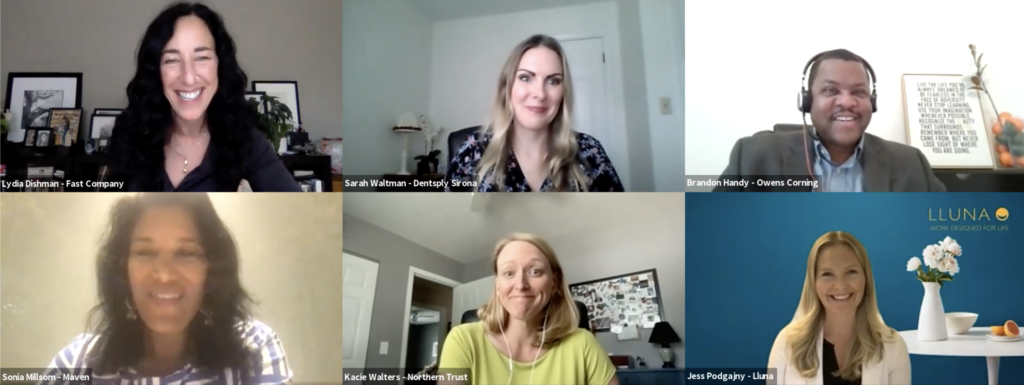The Flexible Workplace: Making It Both Fair and Effective


Workplace flexibility is now top of mind for many employees–to the point where their job loyalty depends on it. More than half of employees would quit their jobs if they’re not given enough flexibility in their work hours, according to a global survey of 16,000 workers earlier this year by the firm EY. On average, employees want to work remotely between two and three days a week after the pandemic, the survey showed.
What can companies do to fulfill those expectations? A From Day One panel of experts tackled the challenges and opportunities of the flexible workplace, outlining the ways to make it both fair for employees and effective for companies, part of a recent conference titled, “Learning From a Crisis About What Working Parents Need.”
“As we collectively experience the ‘Great Resignation,’ employees have more leverage than ever to get their specific needs met, both personally and professionally,” said moderator Lydia Dishman, a staff editor for Fast Company. “Among those is flexibility.”
Panelists offered plenty of examples of how their companies have embraced flexibility, kicking off the conversation with how work hours have changed. At Dentsply Sirona, the world's largest manufacturer of professional dental products and technologies, “We’re focusing more on what work needs to get done, and letting it be an individual’s decision on how long all of that takes,” said Sarah Waltman, the company’s VP of global talent enablement. For manufacturing employees with set work hours, the company now allows them to take unplanned time off in one-hour increments as opposed to strictly eight-hour increments. “It’s a benefit for the organization as well,” she added.
Several panelists asserted that the pandemic hasn’t reduced workplace productivity–yet the lack of boundaries between work and home has led to an epidemic of burnout. As a remedy, companies are encouraging employees to put more structure in place while working remotely. “One of the biggest things we’ve focused on is helping people manage the change for their end of the workday,” said Brandon Handy, a director of HR at Owens Corning, the maker of building and industrial materials. “We’ve had a series of conversations to define that and make it a safe space for someone to talk about [their schedule].”

Jess Podgajny, the founder and CEO of LLUNA, an HR tech platform that offers personalized employment arrangements, assessed some larger trends emerging in the push for flexible workplaces. “There’s a lot of interest and attention in the compressed work week,” she said. “It’s in high demand on the employee side.” Among the options companies are considering: four-day weeks with ten hours over four days, as well as a four-day work week of 32 hours. “Case studies out there show there isn’t a drop in productivity when companies shift from 40- to 32-hour work weeks,” she noted.
For working parents in particular, Podgajny stressed that “predictability is so important–knowing the plan and the schedule.” But with all the uncertainties throughout the pandemic, “the second piece of that is permission–when companies say you have permission to adjust if you have a circumstance come up, or you need to change your schedule for a period of time.”
Sonia Millsom, the chief commercial officer at Maven Clinic, a health care platform for women and families, said that flexibility should also apply to employee-benefit offerings. “They should be flexible, on-demand, and 24/7,” she said, emphasizing the importance of health and mental-health offerings. “The financial reimbursement pieces are not enough, you have to have real mental-health support and other programs available.” She added that employees also seek more holistic, flexible benefits for families: “We found that 68% of millennials consider fertility coverage when choosing an employer.”
Kacie Walters, head of global professional development for Northern Trust, the Chicago-based financial-services firm, added that career development is another priority for employees. With equity in mind, the company is expanding access to resources like career coaching. “Development programs from anywhere you are, at any time of day that works for you–that’s how we’re addressing our learning strategy,” she said.
Podgajny said companies that can’t offer full-fledged training or coaching programs can implement more grassroots options, like offering free or affordable online courses and simply asking employees how they’d prefer to receive feedback. Walters added that mentoring has been an effective people-to-people strategy for the company.
Since a watchword of HR right now is about having an approach that’s individualized, panelists said they’re responding to diverse employee needs by relying on digital tools, like surveys and analytics. “Someone’s wants around flexibility are different in an office than in a warehouse,” said Handy of Owens Corning. “We have full global surveys,” he said, “and we have analytical tools for pulse surveys to get feedback in the moment and adjust.”
Waltman said that Dentsply Sirona has balanced data-gathering with listening to employee feedback. “More engaged employees are also more productive employees. We’re focusing on that connection,” she said. “All the data show that the more you lean into being human-centered and focusing on the employee, the better results your organization has, whether that’s leaning into flexibility, better benefits, or different programs and training.”
Emily Nonko is a Brooklyn, NY-based reporter who writes about real estate, architecture, urbanism and design. Her work has appeared in the Wall Street Journal, New York magazine, Curbed and other publications.
The From Day One Newsletter is a monthly roundup of articles, features, and editorials on innovative ways for companies to forge stronger relationships with their employees, customers, and communities.